[July 30 is World Day Against Trafficking in Persons] Vietnam strengthens the operation of an “Anti-TIP Hotline” to eliminate human trafficking
2021.07.30
Trafficking in Persons (TIP) is the practice of recruiting, transporting, and selling persons for the purpose of exploiting them for labor or forcing them to engage in sexual services. It is a serious crime that violates the human rights of the victims. To combat TIP occurring across countries in Southeast Asia, JICA has been strengthening cooperation in the Mekong region (Thailand, Cambodia, Laos, Myanmar, and Vietnam) in order to support the social reintegration of victims and survivors.
In Vietnam, poor villagers often fall victim to human trafficking in the process of migrating to work. JICA has been strengthening the "Anti-TIP Hotline," a telephone counseling and support service launched in collaboration with the Vietnamese government, to prevent human trafficking, rescue victims, and help their social reintegration.
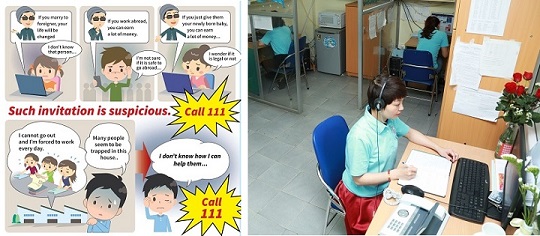
(Left) A simple pamphlet introducing the Anti-TIP Hotline
(Right) The Hanoi Operation Center. The Anti-TIP Hotline has 24/7 call centers in three locations, including Hanoi
TIP is often a crime committed by organized groups, and is difficult to detect and to arrest the perpetrators due to concealment of evidence. The number of human trafficking incidents in Vietnam has been on the rise for the past 15 years. Since 2020, with the sealing of the border to prevent the spread of COVID-19, international TIP has temporarily declined. However, there are concerns that crimes may reemerge as the risk is elevated due to increased economic hardship caused by the COVID-19.
In 2012, JICA, together with the Department of Child Care and Protection (DCCP– Department of Chid Affairs, now known as DCA) of the Ministry of Labour - Invalids and Social Affairs (MOLISA), launched the first project of its kind in the country, including the creation of the Anti-TIP Hotline to provide telephone counseling on TIP. The Hotline's primary mission is to provide information on various types of support for victims of TIP, rescue and support, and provide psychological aid for victims and survivors of trafficking.
“In the nine years since its inception, the Anti-TIP Hotline has been enhanced and its functions have improved.” JICA`s Chief Adviser IWASHINA Masako, who is involved in the Anti-TIP Hotline project, talks about the efforts to date aimed at strengthening its functions.
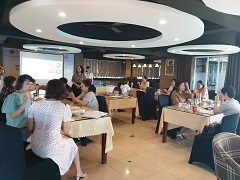
Role-playing in pairs during telephone counselor training
“When victims seek help, it is important to grasp the exact situation they are in, including their current location and environment, and make accurate judgments. The Hotline is not just for phone calls. Users can also access it through social networking sites such as Facebook. When providing psychological support to victims and survivors, it is essential for the counselor to be in contact with the person's feelings so that a solution can be found together as they speak. For this reason, we conduct training programs to improve the skills of our telephone counselors, covering basic and advanced counseling skills. In addition to lectures, we incorporate group activities and role-playing, so our counselors have acquired the ability to deal with a variety of cases.”
Furthermore, the DCA regularly holds conferences and training with relevant agencies such as the police, border guard command, and the Vietnam Women's Union. “It is important for various organizations to work in cooperation to combat human trafficking. Depending on the situation, the Anti-TIP Hotline makes requests to multiple organizations to mobilize to rescue victims or to gather information. Our daily efforts to build a relationship of trust are what counts when it comes to cooperation in time-sensitive situations,” says Ms. Iwashina.
Despite progress being made in preventing TIP and improving the environment for victim protection, public awareness of the Anti-TIP Hotline is low at 12.3% (as of the 2019 survey), and thus continuous publicity efforts are necessary. Given the fact that many victims and survivors are ethnic minorities living in rural areas, TV commercials have been produced in their local languages. Additionally, to protect the younger generations, animation has been used to advocate for the prevention of TIP.
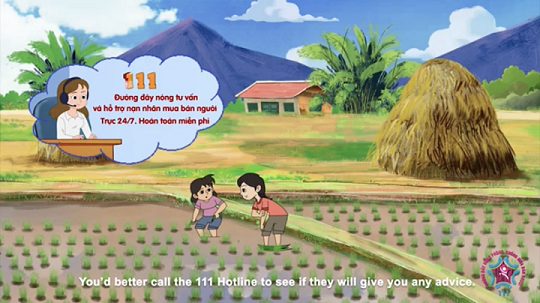
Animation produced for different age groups, to raise awareness of the dangers lurking in their daily lives
In addition to the operation of the Anti-TIP Hotline, the project also assisted in the revision of a governmental decree that specifies the support for victims and survivors.
“While interviewing actual victims and survivors, the project assessed the status of support over the past five years and made significant revisions to the relevant items of the decree to make it easier for them to receive financial and medical support.” The project is helping victims and survivors to reintegrate into community.
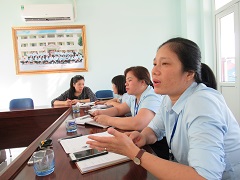
Government personnel answering questions about the results of the decree to provide support to victims
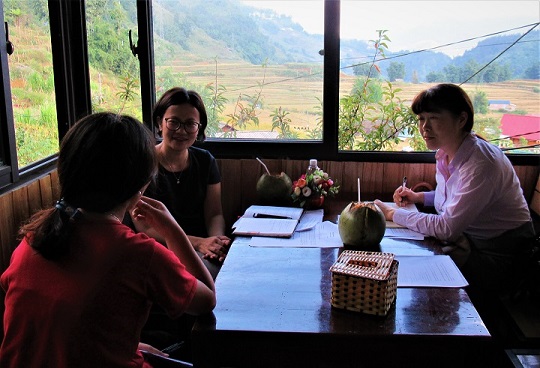
To ensure the decree incorporates practical support measures, face-to-face interviews with victims and survivors were conducted
“Based on proposals from the DCA staff members who are progressing with local activities, we will begin efforts to make the Hotline function more effectively.” Although the effects of COVID-19 prevented JICA experts in Japan from traveling to Vietnam for over a year, Ms. Iwashina says that the motivation of the Vietnamese government is increasing.
First of all, the project team will produce standard materials for training. Since telephone counselors receive consultations on a wide variety of cases, they are under a great deal of stress, which can lead to a certain portion of the counselors leaving their jobs. In order to preserve the quality of the call center in the midst of personnel turnover, they began drafting standard training materials that summarize the content of previous training programs, with experienced counselors playing a central role.
In addition, the team will start making a documentary film. Many of the victims and survivors say, “I never imagined that I, myself, would be involved in such trouble.” Therefore, there is a need to make more people aware of the risks of human trafficking that exist in their daily lives. This should contribute to the prevention of TIP cases and avoidance of worst-case scenarios.

(Left) Project members at work
(Right) The project team with the DCA staff and other relevant agencies
Ms. Iwashina recalled her experience when she was assigned to Laos as part of a JICA educational project, where she saw women who had been sexually abused by brokers being discriminated against and talked about behind their backs by men in the village.
“I was shocked by the reality that those who returned to their hometown after a life-threatening ordeal would once again be hurt by the villagers. That experience is what prompted me to take action in the TIP project in Vietnam," said Ms. Iwashina, with a sense of mission. On July 30, World Day Against Trafficking in Persons, Ms. Iwashina hopes to deliver the following message to as many people as possible.
“Human trafficking may not be something that we are familiar with in Japan, but that doesn't mean it doesn't exist. If you come across a case of malicious labor exploitation or sexual exploitation, by all means, please speak up. Also, we, as individual consumers, can indirectly contribute to the deterrence of crime by choosing not to buy goods produced through labor exploitation or child labor.”
scroll